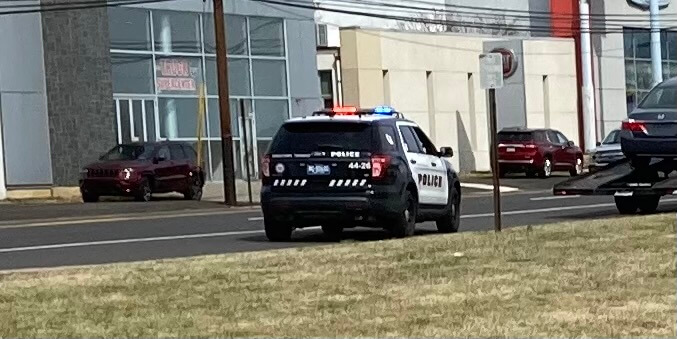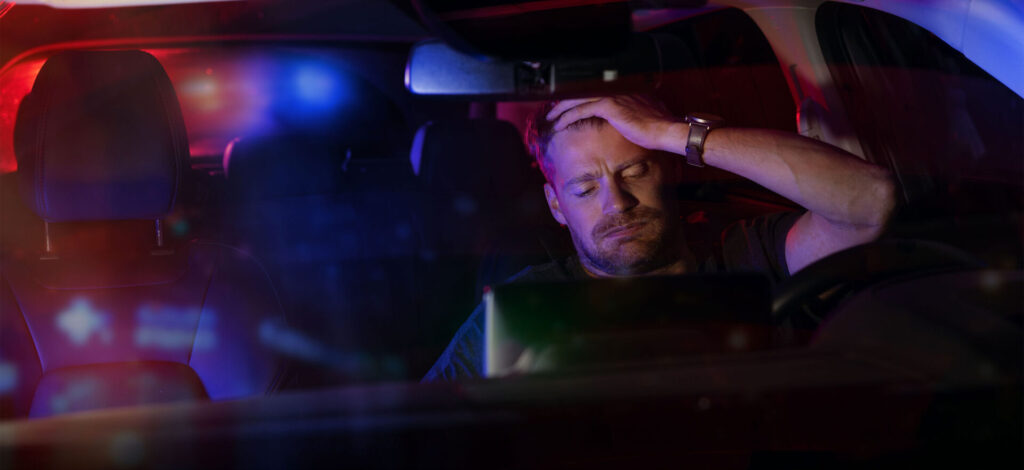Last Updated on November 19, 2024 by Keith E. McAndrews, Esquire
I recently won a pre-trial suppression of evidence hearing in Bucks County, Pennsylvania, in a case involving an extended police vehicle stop. The police initially pulled the car over for counterfeit inspection stickers. Eventually, the law enforcement officers searched the vehicle and recovered illegal drugs and drug paraphernalia. However, the trial court dismissed the case, concluding that the prolonged detention of my client violated their federal and state Constitutional rights. In the following blog post, I will examine the question: when does a prolonged traffic stop violate your constitutional rights in PA?
The Court Decision
In making the ruling, the judge found that the police exceeded the time permitted to detain the driver and front-seat passenger of the vehicle allowed the law. As a result, the judge concluded that the prolonged detention violated the Fourth Amendment of the United States Constitution.
Illegal Traffic Stop Lawyer
I have over a decade of experience defending drivers charged with drug and weapons crimes after the police conduct an illegal traffic stop.
My practice area includes Montgomery County, Bucks County, Delaware County, Chester County, and Philadelphia County. Contact me at (215) 752-5282 if you believe you were the victim of an illegal prolonged car stop.
Examples of Unlawful Extended Traffic Stops
The majority of illegal police traffic stop cases involve the following traffic violations:
- Tinted windows
- Driving under suspension
- Failure to stop for a red light
- Exceeding maximum speed
- Obstruction of the license plate
Common PA Crimes Resulting from Illegal Protracted Police Traffic Stops
Unfortunately, the police may file more serious criminal charges after stopping a driver for a minor PA traffic offense. These criminal offenses ordinarily result from illegal stops by the police:
- Possession of a controlled substance
- Possession of drug paraphernalia
- Driving under the influence of alcohol
- Driving under the influence of a controlled substance
- Illegal possession of a firearm
Contact me at (215) 752-5282 for a free initial consultation, or fill out the confidential contact form for an immediate response.
What is the Most Common Example of an Illegal Delay During a Traffic Stop?
I have represented people in cases involving thousands of illegal traffic stops. The most common tactic used by the police is to begin the interaction with the driver by claiming that the stop relates to some minor traffic infraction.
Examples include: running a stop sign, failing to use a turn signal, or having a broken brake light. In most cases, the police transition from questions about the traffic violation to interrogation about the driver’s suspected drug usage, drug possession, or other alleged criminal activity.
This type of encounter is highly coercive and intimidating to the driver. Under these circumstances, the driver usually feels they have no choice but to admit to drug usage, consent to the search of their car, or both.
I currently have a case where a state trooper began questioning my client about drug usage 15 seconds into the encounter after the state police stopped him for a traffic ticket. Did this happen to you? If so, the police may have violated your constitutional rights. Contact me to discuss your case.
Facts of the Bucks County Traffic Stop Case
A police officer in a marked patrol car conducted a traffic stop of a driver and a front-seat passenger in Southampton, PA. My client was the front-seat passenger in the vehicle. Consequently, the driver parked the car in the parking lot of a doctor’s office after the patrol officer activated the overhead lights.
At the same time, the police officer positioned his vehicle directly behind the driver’s vehicle. In addition, the patrol car remained behind the driver’s vehicle for the entire encounter satisfying the legal standard for a “seizure” under Pennsylvania law.
The Initial Police Encounter
The police officer got out of his vehicle and spoke to the driver and the passenger, who remained seated. The driver and the car passenger provided personal identification, vehicle registration, and insurance information to the police officer.
Both the driver and passenger denied knowing that the inspection sticker was fraudulent.
The Traffic Investigation Turns into a Criminal Investigation
The police officer returned to his patrol car to verify the occupant’s license, registration, and insurance status. While that was occurring, a second patrol officer arrived as backup. All of the documents were verified as proper.
Before completing the traffic ticket investigation, the officer completed the following tasks:
- Ran a criminal history of the driver and front-seat passenger
- Contacted a police officer in another township requesting any criminal information about the occupants
Within minutes, the police officer in the neighboring township contacted the officer at the scene of the car stop. That police officer informed the officer that the driver and front-seat passenger had a history of criminal arrests and criminal investigations.
As a result, the police removed the driver and front-seat passenger from the car.
The Police Search of the Vehicle
Next, the police searched the vehicle and seized heroin, drug packaging, and plastic tubes with drug residue. As a result, the police charged my client with possession of a controlled substance, possession of drug paraphernalia, and possession of a counterfeit inspection sticker.
Consequently, I filed a Motion to Suppress Evidence before the Bucks County Justice Center trial date.
Can the Police Search Your Car Without a Warrant?
Clients often ask me: Can cops search your car without a warrant? In most situations, the answer is no. The police are not permitted to search your vehicle if the search results from an unlawful prolonged traffic stop.
Also, the police can only search your car unless they prove that an exception to the search warrant requirement applies to your case. Exceptions to the search warrant requirement include the following:
- You consented to the search of the car (the consent must be voluntary and not the result of duress or coercion)
- The police observe criminal evidence in plain view inside the vehicle (the police cannot enter the car to view the evidence)
- There are exigent (emergency) circumstances (however, the police cannot create the exigent circumstances)
- The search of the vehicle occurs as part of a post-arrest police inventory search (only applies if your constitutional rights were not violated before the inventory search)
The United States Supreme Court case of Rodriguez v. United States
In the 2015 case of Rodriguez v. United States, the United States Supreme Court declared that the police violate the Fourth Amendment of the United States Constitution when they extend the duration of a traffic stop investigation without possessing probable cause or reasonable suspicion of a crime.
The Circumstances in Rodriguez v. United States
In Rodriguez, the police stopped the driver for a minor traffic offense. The police completed the traffic investigation and detained the driver until a backup police officer arrived. Finally, the police officers conducted a canine sniff of the vehicle, discovering methamphetamine.
The United States Supreme Court declared that the detention of the driver and search of the vehicle violated the Fourth Amendment of The United States Constitution.
The Justices in Rodriguez ruled that police did not have a lawful reason for the continued detention of the driver or the subsequent search of the vehicle.
How Long Can Police Detain You on a Traffic Stop?
Clients frequently ask me: how long can you be detained for a traffic stop? According to the Rodriguez Court, the police can stop you for a traffic violation for as long as it takes to verify the following four things:
- You have a valid driver’s license
- You have no outstanding warrants for your arrest
- You have proper vehicle insurance
- Your vehicle is legally registered
The Court ruled that if the police go outside these four tasks, even if it only causes a slight delay, they must at least have reasonable suspicion of criminal activity. Unfortunately, in many cases, the police can’t meet this requirement.
The Rodriguez court ruled that the police officer’s initial justification for the driver’s detention ended as soon as the tasks related to the traffic stop had finished.
Why the Rodriguez Case is Important if the Police Subject You to an Unlawful Stop
The Rodriguez Court declared that once the police complete the mission of the traffic stop, they must possess probable cause or reasonable suspicion of a crime to continue detaining the driver and passengers.
Reasonable Suspicion Traffic Stop
In addition, the Rodriguez Court stated that without probable cause or reasonable suspicion of criminal activity, the police cannot prolong the traffic investigation to conduct any of the following acts:
- Run a criminal history check of a driver or passenger
- Conduct a canine sniff of the car
- Contact another law enforcement agency for criminal history information
- Detain and question the driver about illegal contraband in the vehicle
How is Reasonable Suspicion of a Crime Determined by the Courts?
In determining whether the police have established reasonable suspicion of a crime, the state and federal courts will examine the following factors:
- The totality of the circumstances of the incident; and
- Specific and articulable facts, and
- Rational inferences from those facts point to the conclusion that:
- The driver or passenger is engaged in criminal activity
- Finally, the police cannot rely on a hunch
How I Won the Case
During the pre-trial hearing, the police officer testified that the driver and front-seat passenger acted nervously during his initial contact. However, the police officer conceded that the allegedly suspicious behavior occurred before he conducted the criminal history check and communication with the police officer in the neighboring township.
The Prosecution Argument
The prosecutor did not argue that the police had probable cause to believe that the car’s occupants had committed a crime when he extended his investigation. Instead, the prosecutor asserted that the nervous behavior of the vehicle’s occupants created a reasonable suspicion of criminal conduct, justifying the delay in the traffic violation investigation.
My Argument that Suppression of Evidence Should be Granted
I successfully argued that the driver and the front-seat passenger’s allegedly suspicious behavior was insufficient to establish reasonable suspicion of criminal activity.
Notably, the judge agreed and ruled that the communication with the neighboring police officer and criminal history check of the driver and front-seat passenger unlawfully extended the traffic stop. As a result, the judge concluded that the subsequent search and seizure of illegal drugs and contraband from the vehicle resulted from the unlawful investigative detention of the driver and passenger of the car.
The court suppressed the drug and contraband evidence. The district attorney eventually dismissed the case.
Conclusion
In Rodriguez, the United States Supreme Court placed specific limits on how long the police can detain you after a traffic stop for a motor vehicle code violation. They ruled that a law enforcement officer must have probable cause or reasonable suspicion of a crime if:
- Police deviate from the mission of the traffic stop investigation (even minimally) before its completion; or
- Police complete the investigation of the traffic charge and begin a criminal investigation
Prolonged Traffic Stop Lawyer
Were you wrongfully pulled over by the police? I have over a decade of experience fighting in court for Pennsylvania drivers who are the victims of illegal police stops in Bucks County, Montgomery County, and the surrounding Pennsylvania Counties.
Those crimes include traffic violations, driving under the influence of alcohol, driving under the influence of drugs, drug possession, and firearm possession. Contact me at (215) 752-5282 for a free initial consultation, or fill out the confidential contact form for an immediate response.






